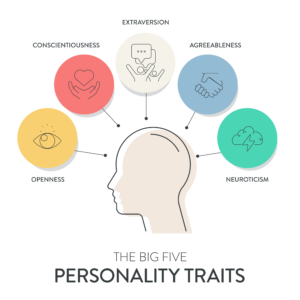Big Five Personality Traits: A Foundation for Modern Assessments
Personality plays a crucial role in shaping our behaviors, attitudes, and overall interactions with the world. One of the most widely accepted frameworks for understanding personality is the Big Five Personality Traits model—also known as the OCEAN model—consist of five broad dimensions that describe human personality. These traits are:
- Openness to Experience
- Conscientiousness
- Extraversion
- Agreeableness
- Neuroticism
In the field of psychological and educational assessment, personality measurements serve as powerful tools for understanding individuals and predicting outcomes like job performance, academic success, and personal satisfaction. In this blog post, we will explore the Big Five’s role in assessments and highlight its relevance in various applications.
The Big Five and Assessment: Practical Applications
The Big Five Personality Traits are widely used in assessments across fields, from human resources to clinical psychology, and even in education. These traits provide a measurable, standardized way of understanding an individual’s personality. Through assessments based on this model, employers can predict how well a potential employee might fit within a team, or educational institutions can gauge a student’s learning preferences and potential areas of growth.
Here’s a breakdown of how the Big Five dimensions translate into practical assessments:

- Openness to Experience: This trait reflects creativity, curiosity, and a willingness to embrace new ideas. Assessments can use this dimension to identify candidates or students who thrive in environments requiring innovation and adaptability.
- Conscientiousness: Often linked to self-discipline, responsibility, and goal-directed behavior, conscientiousness assessments are crucial in predicting job performance. Employees high in conscientiousness tend to be reliable, organized, and effective in roles requiring careful planning and execution.
- Extraversion: Assessing extraversion helps understand how individuals interact with their environment. In team-based settings, extraverted individuals are often proactive, enthusiastic, and effective communicators. This trait is particularly relevant in leadership assessments, as discussed in our post on general intelligence and leadership dynamics.
- Agreeableness: Personality assessments measuring agreeableness can reveal how cooperative, empathetic, and considerate a person is. High levels of agreeableness are often associated with positive teamwork dynamics, which is valuable for roles involving collaboration and conflict resolution.
- Neuroticism: This trait measures emotional stability. Individuals with lower neuroticism scores are better able to cope with stress and are less likely to experience negative emotions frequently. Understanding this trait helps organizations manage workplace stress and predict an employee’s reaction to pressure.
A critical method used to develop and validate the Big Five framework is factor analysis, a statistical technique that helps identify underlying variables or factors that explain the patterns observed in data. Factor analysis ensures that each trait in the model reflects distinct personality dimensions, contributing to its scientific rigor and practical applicability in assessments.
Adapting Big Five Assessments Across Populations: Example Items
The Big Five Personality Traits offer a flexible framework for assessing personality across diverse groups. Tailoring assessment items to specific populations—such as high school students, job candidates, or employees—ensures that the results are relevant and actionable. Below are examples of how Big Five items might vary to suit these distinct contexts:
High School Students
High school assessments aim to capture personality traits in a way that is relatable to young learners’ academic and social experiences. The language is straightforward, focusing on school-related scenarios and responsibilities.
- Openness to Experience: “I enjoy trying new activities in school, even if they’re unfamiliar to me.”
- Conscientiousness: “I complete my homework on time and organize my assignments.”
- Extraversion: “I often speak up in class discussions and like working with others on group projects.”
- Agreeableness: “I try to understand my classmates’ feelings and help them when I can.”
- Neuroticism: “I get nervous before tests or when I have to speak in front of the class.”
College Students

For college assessments, items often bridge between academic and emerging professional experiences. Questions highlight independence and social interactions typical in a college environment.
- Openness to Experience: “I seek out new learning experiences that help broaden my academic interests.”
- Conscientiousness: “I manage my study schedule effectively to stay on top of my coursework.”
- Extraversion: “I feel comfortable participating in campus organizations or social activities.”
- Agreeableness: “I respect my classmates’ ideas during group assignments and try to work toward common goals.”
- Neuroticism: “I can manage academic pressure and stay calm during exams.”
Job Candidates or Employees
For employee selection and professional development, items are adapted to reflect workplace scenarios. The questions target traits relevant to job performance, teamwork, and adaptability in a professional setting.
- Openness to Experience: “I am comfortable taking on new projects, even if they involve skills I haven’t fully developed yet.”
- Conscientiousness: “I am meticulous in planning and meeting deadlines at work.”
- Extraversion: “I enjoy collaborating with team members and sharing ideas in meetings.”
- Agreeableness: “I make an effort to understand my colleagues’ perspectives and offer help when needed.”
- Neuroticism: “I handle work-related stress effectively, staying calm under pressure.”
These examples illustrate the adaptability of the Big Five model, ensuring that assessments are both meaningful and relevant to the unique demands of each population. By adjusting the context and language, personality assessments can yield insights that are more closely aligned with individuals’ day-to-day environments and challenges.
Assessing Personality in Recruitment and Development

Personality assessments based on the Big Five are particularly valuable in recruitment and professional development. These tests allow employers to gain insights into whether a candidate’s personality traits align with the demands of the role or the company culture. For instance, a high score in conscientiousness might indicate a strong fit for roles requiring meticulous attention to detail, while high extraversion may be suited for sales or customer-facing positions.
In the educational domain, personality assessments can guide personalized learning experiences. By understanding student’s traits, teachers and administrators can tailor learning environments that optimize student engagement and motivation, aligning personality with learning approaches. The use of personality data alongside other cognitive measures, like general intelligence tests, provides a more holistic view of an individual’s strengths and areas for growth. For instance, this paper investigates the impact of Big Five personality traits on the academic performance of university students.
The Value of Big Five Assessments in Modern Contexts
Modern assessments incorporating the Big Five model provide organizations and institutions with actionable insights. They help predict employee retention, job satisfaction, academic achievement, and overall well-being. In an era where data-driven decisions are crucial, using personality assessments allows for more informed hiring, training, and development processes.
As technology continues to advance, these assessments are becoming more efficient and accessible through tools like computerized adaptive testing (CAT) and online platforms. These modern approaches ensure that personality assessments are more personalized and adaptive to the test-taker’s responses, enhancing the accuracy and relevance of the results.
Exploring Open-Source Personality Assessments
For those interested in learning more about Big Five personality assessments, the Open Psychometrics Project provides access to an IPIP-based Big Five assessment. This resource offers a practical introduction to personality testing, allowing users to explore the model’s dimensions through a public, scientifically supported tool.
Conclusion
The Big Five Personality Traits are foundational in the field of assessment, offering a reliable and scientifically grounded framework to understand and measure human behavior. Whether applied in recruitment, educational development, or personal growth, assessments based on the Big Five provide insights that help individuals and organizations thrive.
Laila Issayeva M.Sc.
Latest posts by Laila Issayeva M.Sc. (see all)
- Big Five Personality Traits: A Foundation for Modern Assessments - November 1, 2024
- Factor Analysis: Evaluating Dimensionality in Assessment - August 16, 2024
- What is Digital Assessment, aka e-Assessment? - May 18, 2024

